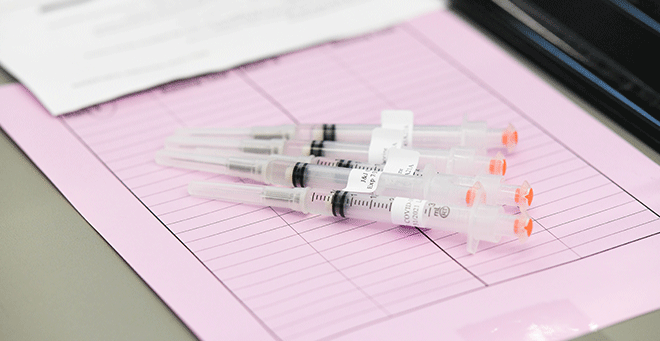The benefits of the COVID-19 vaccine for pregnant women and their babies are backed by solid, ongoing research, according to UMass Medical School chair and professor of obstetrics & gynecology Tiffany A. Moore Simas, MD, MPH, MEd.

Citing the increased risk of severe illness and mortality from SARS-CoV-2 infection in pregnant women, weighed against data showing that COVID-19 vaccines are safe and effective during pregnancy, Dr. Moore Simas said she supports the U.S. Centers for Disease Control and Prevention’s recent recommendation that all people aged 12 and older, including women who are pregnant, breastfeeding, trying to get pregnant now, or might become pregnant in the future, get vaccinated against the disease.
The CDC’s recommendation comes after similar recommendations from the American College of Obstetricians and Gynecologists and the Society for Maternal-Fetal Medicine.
“Since the vaccine became available, pregnant ob-gyns have been very proudly sharing on social media their band-aided vaccinated arms and their vaccination cards, being an example and leading the charge,” Moore Simas said.
Moore Simas said the CDC has been following thousands of pregnant women who received the COVID-19 vaccine since early winter through the v-safe pregnancy registry. Nearly 150,000 participants tracking their health status in v-safe said they were pregnant at the time of vaccination, according to the CDC. More than 5,000 have enrolled in ongoing v-safe pregnancy studies.
Additionally, studies being done at UMass Medical School and elsewhere have examined biomarkers and effects of COVID-19 on mothers and their babies.
When Moore Simas initially talks to patients in the office though, she said, attitudes toward getting vaccinated are “pretty split” between those who are all in and those who want to hold off. She said she hoped the CDC’s recommendation help make the benefits clearer.
One concern mentioned by some vaccine-hesitant women who are planning pregnancy, according to Moore Simas, is about the vaccine potentially affecting fertility. She said those concerns are “unfounded, not supported by the scientific literature. There’s nothing in the mechanisms of the vaccines and biologic plausibility that would lead anyone to believe that.”
“All the studies that have come out so far continue to support that there is no issue with the vaccines, and in fact, there are some studies that actually show that women who get the vaccine are doing better than those that don’t in things like preterm birth,” she said.
Heidi Leftwich, DO, is the principal investigator for several studies looking at the impact of SARS-CoV-2 infection on pregnant and breastfeeding women and newborns. The COVID-19 Analysis on Perinatal Specimens Related to ExpoSure (CARES) study includes collaboration with three laboratories to research COVID-19 and breast milk, the gut microbiome and placenta/cord blood.
Dr. Leftwich, assistant professor of obstetrics & gynecology and associate fellowship director in the Division of Maternal-Fetal Medicine, said there is an increased risk of severe illness and mortality with pregnant women who are infected with SARS-CoV-2 during pregnancy. “There’s increased risk of hospitalizations, intubations, preterm birth and maternal death, which is, sadly, hitting the news case by case,” she said.
A study accepted for publication in Breastfeeding Medicine, by Leftwich in collaboration with Kathleen F. Arcaro, PhD, associate professor in the College of Natural Sciences at UMass Amherst, and UMass Amherst PhD candidate Vignesh Narayanaswamy, showed that immunity is passed along through breast milk after a woman is infected with COVID-19 during pregnancy. Researchers have also collected data on breast milk of pregnant women who were vaccinated, but that hasn’t been published yet.
Leftwich and Ana Maldonado-Contreras, PhD, assistant professor of microbiology & physiological systems, have been studying the gut microbiome of mothers and babies from mothers infected by SARS-CoV-2 before delivery. Preliminary data reflect a change in the gut bacteria in mothers who had COVID-19 compared with healthy controls. Clinical implications of this change in the microbiome are yet to be determined. They are continuing to analyze the data with plans for publication this fall.
Leftwich and Ann M. Moorman, PhD, MPH, professor of medicine, and summer undergraduate intern Dominic Ritacco have been studying the histologic and immunologic placenta and cord-blood changes that occur in women with SARS-CoV-2 infections, including the life-threatening condition of preeclampsia.
“Our research here at UMass, along with national data, supports the importance of avoiding COVID-19 infection during pregnancy. And we have robust data supporting the fact that there is no increase in adverse events in women who are vaccinated,” said Leftwich. “I think when you have something that shows that a disease has increased adverse outcomes, yet the vaccine does not, that makes a compelling argument for COVID-19 vaccination and pregnancy.”
Related stories on UMassMed News:
UMass Medical School rises to ‘health sciences moment’ in COVID-19 pandemic
COVID vaccine trial for kids on track, says KidCOVE principal investigator at UMMS
Delta variant spurring uptick in COVID-19 cases largely in unvaccinated